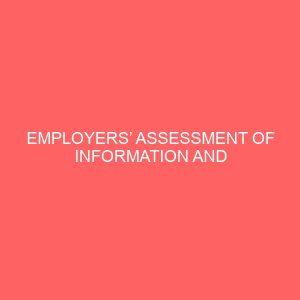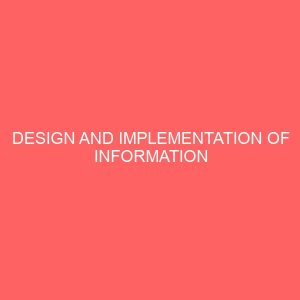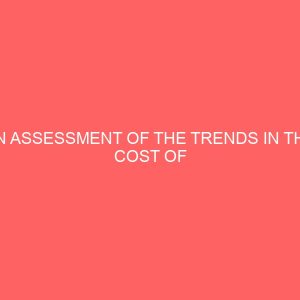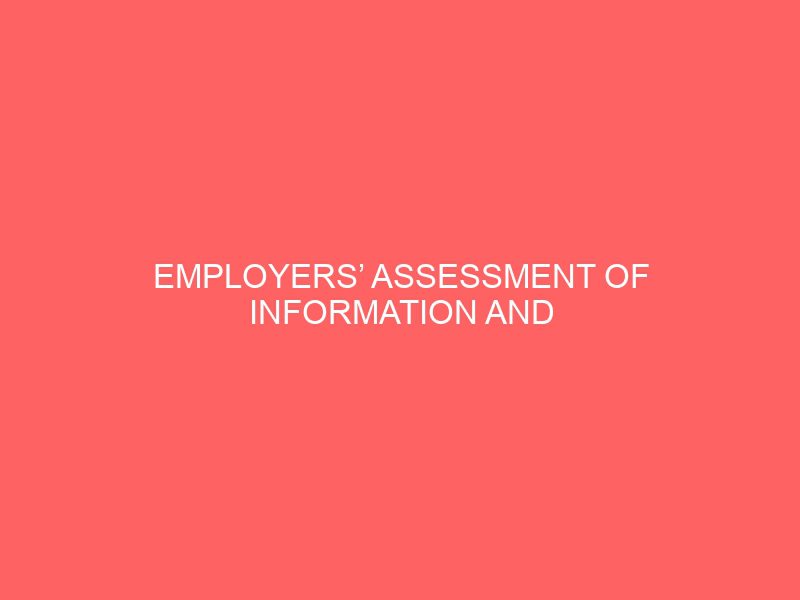Description
ABSTRACT
This study assessed from the point of view of employers, the information and communication technology competencies possessed by secretaries in business organizations in Onitsha North and South local government areas of Anambra State. Four research questions guided the study and four null hypotheses were tested at 0.05 level of significance. The study was carried out in 200 business organizations in Onitsha North and South. A total of 34 questionnaire items arranged in four clusters and structured on a 4point response options was the instrument used for data collection. The instrument was validated by three experts in vocational education and one expert from measurement and evaluation. The reliability of the instrument was determined using Pearson product moment correlation coefficient. The reliability coefficient of 0.73 was obtained and considered high for the instrument to be reliable. A total of 200 copies of the questionnaire were administered to employers in 200 business organizations. The collected instrument was analyzed using percentage, mean, standard deviation, ztest, analysis of variance ANOVA and Scheffe test for multiple comparison. ANOVA and ztest were used to test null hypothesis 1 and 2, 3, 4 respectively. Based on the results of analysis of data, it was found that secretaries in business organizations in Onitsha LGAs were competent in communication technology, information technology management, internet usage and in handling office equipment except in handling digital satellite control equipment and Fax machine. It was recommended that secretaries in business organizations in Onitsha LGAs should attend various forms of in-service trainings in ICT to improve their competencies in those areas.
TABLE OF CONTENTS
TITLE PAGE i
APPROVAL PAGE ii
ACKNOWLEDGEMENTS iii
ABSTRACT iv
TABLE OF CONTENTS v
LIST OF TABLES ix
LIST OF APPENDICES x
CERTIFICATION PAGE xi
DEDICATION PAGE xii
CHAPTER ONE: INTRODUCTION 1
BACKGROUND TO THE STUDY 1
STATEMENT OF THE PROBLEM 4
PURPOSE OF THE STUDY 6
SIGNIFICANCE OF THE STUDY 6
SCOPE OF THE STUDY 9
RESEARCH QUESTIONS 9
HYPOTHESES 10
CHAPTER TWO: REVIEW OF RELATED LITERATURE 11
Conceptual Framework 12
Concept of Secretary 13
Concept of Competence 14
Concept of Business Organization 17
Information and Communication Technology 23
Theoretical Framework 26
Attribution theory 26
Dialectic Theory of Relationship 28
Expectancy Theory 29
Theoretical Studies 31
Categories of Secretaries in Business Organization 31
Benefits of ICT usage in Business Organization 41
Challenges of ICT usage in Business Organizations 45
ICT Competencies Possessed by Secretaries 51
Training and Retraining of Secretaries 67
Empirical Studies 77
Summary of Review of Related Literature 83
CHAPTER THREE: METHOD 85
Design of the Study 85
Area of the Study 86
Population of the Study 87
Instrument for Data Collection 88
Validation of the Instrument 89
Reliability of the Instrument 90
Method of Data Collection 90
Method of Data Analysis 91
CHAPTER FOUR: PRESENTATION AND ANALYSIS OF DATA 93
Results of Demographic Data 93
Data Relating to Research Question 1 95
Data Relating to Research Question 2 97
Data Relating to Research Question 3 99
Data Relating to Research Question 4 100
Result of Test of Null Hypotheses 1 102
Result of Test of Null Hypotheses 2 104
Result of Test of Null Hypotheses 3 105
Result of Test of Null Hypotheses 4 106
Summary of Findings 107
CHAPTER FIVE: DISCUSSION OF RESULTS, CONCLUSION
AND RECOMMENDATIONS 109
Discussion of the Findings 109
Secretaries Competencies in Communication Technology 110
Secretaries Competencies in Information Technology 112
Management Secretaries Competencies in Internet Usage 113
Secretaries Competencies in Manipulating Office Equipment 114
Conclusion 115
Implications of the Study 116
Recommendations 117
Limitations of the study 118
Suggestion for Further Studies 119
REFERENCES 120








Reviews
There are no reviews yet.